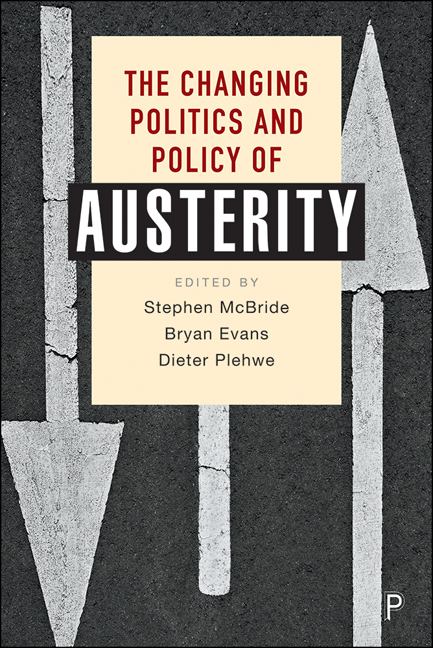Book contents
- Frontmatter
- Contents
- List of figures and tables
- Notes on contributors
- Acknowledgements
- Introduction
- PART I Austerity and the promotion of the private
- PART II Coping and casualties: labour and the social
- PART III Beyond coping: protest, pathologies and the development of real alternatives
- Conclusion
- Index
Introduction
Published online by Cambridge University Press: 13 May 2022
- Frontmatter
- Contents
- List of figures and tables
- Notes on contributors
- Acknowledgements
- Introduction
- PART I Austerity and the promotion of the private
- PART II Coping and casualties: labour and the social
- PART III Beyond coping: protest, pathologies and the development of real alternatives
- Conclusion
- Index
Summary
On 21–22 February 2019, more than a hundred university and non-government organization-based researchers from across Europe, Canada and Australia gathered in Berlin to participate in the ‘Austerity: Coping Is Not Enough’ conference. The chapters collected in this volume emerge from this international event which was hosted by the German Social Democratic Party's think tank, the FES. The conference itself grew out of a collaboration between FES and Stephen McBride's ‘Austerity and Its Alternatives’ Canadian-based project funded by the Social Sciences and Humanities Research Council of Canada. The conference participants sought to move the study of post-2008 crisis austerity forward through both a rigorous diagnosis of actually existing austerity as well as imagining the pathways out of permanent austerity. Among the key questions the conference sought to address were: how do social and economic relations change under conditions of permanent austerity? How do international, national and regional political institutions influence the development of austerity-regimes? What commonalities and differences exist between nations? And which alternatives exist to overcome the status quo of austerity politics? To analyze the causes, connections and effects of this new age of austerity-capitalism, a broad debate that questions the core ideas and dominant paradigms that animated politics, explores political alternatives and develops new and far-reaching perspectives is necessary to move beyond the contemporary stasis of coping. And coping is demonstrably not enough. The project of this book is to contribute to moving on.
In the wake of the 2008 crisis, as the ‘clean-up’ rolled out, critics of market liberalization, globalization and financialization saw their initial expectations dashed. Initial optimism was understandable, encouraged as it was by a rapid revival of the largely dormant ‘institutional legacy of Keynesianism’ (Strange 2012, 121) by governments and central banks, and doing so regardless of partisan hue. Such a coherent and broad response was seen to herald ‘the end of the Reagan-Thatcher counter-revolution’, nothing less than the demise of the era of neoliberalism (Collignon 2008, 8). It was a profoundly erroneous reading of the historical moment. Instead of witnessing the unravelling of a paradigm, it became an abject lesson in the stickiness of an established social order where neoliberalism, post-crisis, remained very nearly entirely intact, has even been solidified (Crouch 2011, 179; Mirowski 2013).
- Type
- Chapter
- Information
- The Changing Politics and Policy of Austerity , pp. 1 - 22Publisher: Bristol University PressPrint publication year: 2021



